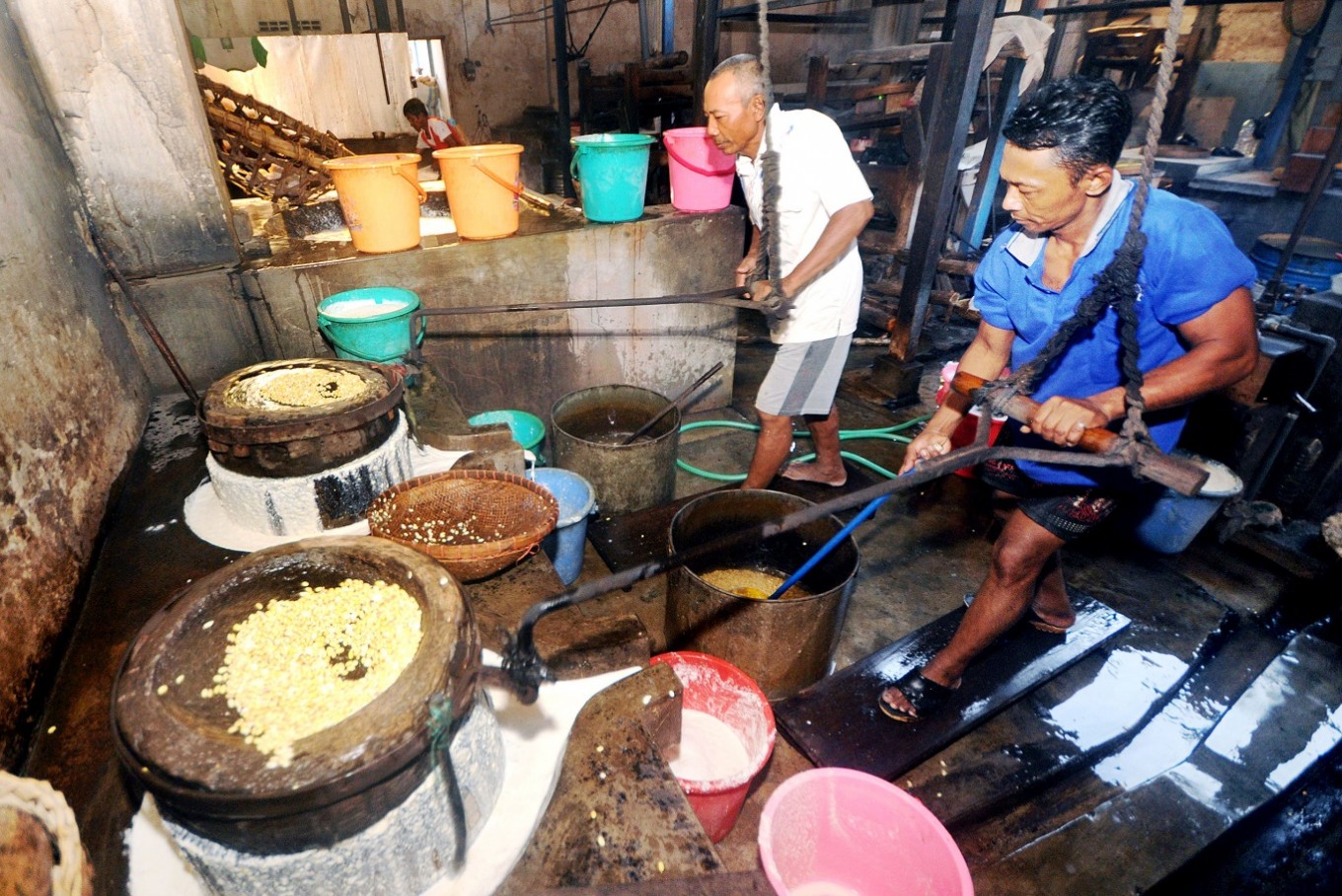Popular Reads
Top Results
Can't find what you're looking for?
View all search resultsPopular Reads
Top Results
Can't find what you're looking for?
View all search resultsKediri's Bah Kacung tofu: Tradition matters
Indonesian food buffs associate Kediri in East Java with tofu, which is a signature dish and snack from the city.
Change text size
Gift Premium Articles
to Anyone
T
he ethnic Chinese community has made an important contribution to the history of Kediri, which is also famously called Kota Tahu (tofu city). This well-known favorite has its origins in the arrival of immigrants from China in the early 1900s.
The Chinese brought their culinary skills to the city by introducing tofu as one of their food specialties. While tofu from other regions is generally white, Kediri’s soybean curd is typically golden yellow and commonly called tahu takwa.
Historical records refer to Lauw Soen Hok, Liem Go Moy and Kaou Loung as the three tofu-making pioneers in Kediri, which is believed to be the place of entry for tofu to Indonesia. Since then, dozens of tofu producers from small and medium enterprises have emerged with their respective outlets and brands.
Lauw Soen Hok, who started his tofu business on Jl. Patimura, Kediri, in 1912, was one of the city’s major tofu producers. Lauw Soen Hok, who was better known as Bah Kacung, managed the factory until he died. His son, Lauw Sing Hian, aka Seger Budi Santoso, took over managing the business and moved the factory to Jl. Trunojoyo, Kediri in 1966.
Read also: A luscious portion of 'serabi' with a modern touch
Seger Budi Santoso died in 2008 and Bah Kacung tahu takwa shop is now managed by Lauw Soen Djing, aka Herman Budiono, as the third-generation owner. The 49-year-old man said this family business could survive by maintaining its tofu quality and flavor. “We continue to produce tofu by traditional means,” he said at his shop earlier this year.
The name Bah Kacung was given to his grandfather due to his close relationship with local people, making him more popular because of this moniker. Herman maintains the way the family produces tofu by using wooden and stone devices as well as firewood, all being manually handled. He said stone grinders preserved the tofu’s flavor because unlike machines, the soybeans weren’t fully mashed. Packed: Bah Kacung tofu is wrapped in banana leaves and packed in a woven bamboo box.
After being pulverized, the soybeans are boiled over burning firewood and then strained to obtain the soft pulp, which is treated with vinegar to create a firm texture. “The addition of a certain amount of vinegar should go along with stirring the pulp slowly,” Herman said.
The next step is processing the curd by using wooden blocks with iron weights. The golden color is derived from crushed turmeric, which not only makes the tofu yellow but also serves as a natural preservative.
Read also: The one ingredient the world’s top chefs can’t do without
“We can guarantee that our tofu is free from artificial coloring and preservatives because today tofu manufacturers very rarely use turmeric for either purposes,” Herman said.
A few years ago, the use of illegal preservatives like formalin in tofu production rocked tofu businesses in the country, including in Kediri. Tofu containing only natural ingredients does not last long, prompting some tofu-makers to use dangerous substances to make it last longer.
Bah Kacung tahu takwa is wrapped in banana leaves and packed in woven bamboo boxes called besek in Javanese. Herman’s customers get written instructions at the time of purchase on how to store the tofu.
Herman realized that the high cost of manual production at his factory made his tofu more expensive than other tofu in Kediri, but he was not going after competitive prices.
“Our tofu costs Rp 3,500 [26 US cents] per piece, while other tofu of the same size costs only Rp 1,800 to Rp 2,500,” he said.
Herman said he wanted to offer prices that enabled him to maintain the quality of manual production. He said his employees were skillful and capable of applying standard procedures set by his father and grandfather. Some of them have worked for the business through the generations.
“We’re just like a big family,” Herman said.
Herman’s tofu, labeled Bah Kacung Cakrawijaya, is only available at his shop and is not sold by other agents or outlets. His modest shop, which also serves as the factory, sells tahu takwa along with other snacks.
“For me, this is not merely a business. It serves more as an effort to maintain customer confidence and preserve a tradition that has lasted over a century,” Herman said.











